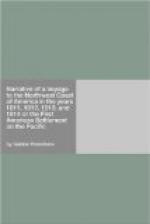Our deck was now as much encumbered as when left New York; for we had been obliged to place our live animals at the gangways, and to board over their pens, on which it was necessary to pass, to work ship. Our own numbers were also augmented; for we had taken a dozen islanders for the service of our intended commercial establishment. Their term of engagement was three years, during which we were to feed and clothe them, and at its expiration they were to receive a hundred dollars in merchandise. The captain had shipped another dozen as hands on the coasting voyage. These people, who make very good sailors, were eager to be taken into employment, and we might easily have carried off a much greater number.
We had contrary winds till the 2d of March, when, having doubled the western extremity of the island, we made northing, and lost sight of these smiling and temperate countries, to enter very soon a colder region and less worthy of being inhabited. The winds were variable, and nothing extraordinary happened to us till the 16th, when, being arrived at the latitude of 35 deg. 11’ north, and in 138 deg. 16’ of west longitude, the wind shifted all of a sudden to the S.S.W., and blew with such violence, that we were forced to strike top-gallant masts and top-sails, and run before the gale with a double reef in our foresail. The rolling of the vessel was greater than in all the gales we had experienced previously. Nevertheless, as we made great headway, and were approaching the continent, the captain by way of precaution, lay to for two nights successively. At last, on the 22d, in the morning, we saw the land. Although we had not been able to take any observations for several days, nevertheless, by the appearance of the coast, we perceived that we were near the mouth of the river Columbia, and were not more than three miles from land. The breakers formed by the bar at the entrance of that river, and which we could distinguish from the ship, left us no room to doubt that we had arrived at last at the end of our voyage.
The wind was blowing in heavy squalls, and the sea ran very high: in spite of that, the captain caused a boat to be lowered, and Mr. Fox (first mate), Basile Lapensee, Ignace Lapensee, Jos. Nadeau, and John Martin, got into her, taking some provisions and firearms, with orders to sound the channel and report themselves on board as soon as possible. The boat was not even supplied with a good sail, or a mast, but one of the partners gave Mr. Fox a pair of bed sheets to serve for the former. Messrs M’Kay and M’Dougall could not help remonstrating with the captain on the imprudence of sending the boat ashore in such weather; but they could not move his obstinacy. The boat’s crew pulled away from the ship; alas! we were never to see her again; and we already had a foreboding of her fate. The next day the wind seemed to moderate, and we approached very near the coast. The entrance of the river, which we plainly distinguished with the naked eye,




